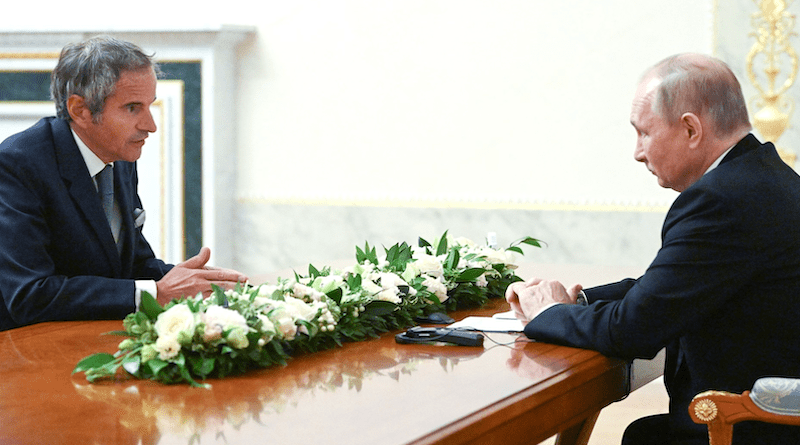IAEA’s Grossi Holds Talks With Russia’s President Putin
International Atomic Energy Agency (IAEA) Director General Rafael Mariano Grossi has held talks with Russian President Vladimir Putin. The talks were arranged as part of efforts to establish a safety and security zone around the Zaporizhzhia nuclear power plant.
The Zaporizhzhia nuclear power plant is near the frontline of the war in Ukraine and has been under the control of the Russian military since early March, although it has continued to be operated by its Ukrainian staff. It is Europe’s largest nuclear power plant with six reactors.
All six reactors are currently in cold shutdown and the plant has faced shelling during the conflict. It has also lost external power for short periods of time and had to rely on emergency diesel generators to provide the energy the reactors and other facilities need to ensure safety and security. The IAEA has been seeking for months to secure an agreement for the plant and the area around it to be a safety and security zone, to minimise the risk of damage from the war.
Last week, Grossi met Ukrainian President Volodymyr Zelensky in Kyiv and they will meet again this week.
Tuesday’s discussions with President Putin in St Petersburg saw the IAEA director general stressing the urgency of the need to agree and implement a protection zone as soon as possible. In a statement released by the IAEA after the talks, Grossi said: “The situation in the region around the Zaporizhzhia Nuclear Power Plant and elsewhere has become increasingly dangerous, precarious and challenging, with frequent military attacks that can also threaten nuclear safety and security.
“Now more than ever, during these extremely difficult times, a protection zone must be established around the ZNPP. We can’t afford to lose any more time. The stakes are high. We must do everything in our power to help ensure that a nuclear accident does not happen during this tragic conflict, as it could cause even more hardship and suffering in Ukraine and beyond.”
In a clip of the meeting broadcast on Russian television, and reported by the official Tass news agency, Putin told Grossi that there was “excessively dangerous politicisation of everything related to nuclear activity”.
He said that Russia was open to dialogue and would discuss all issues relating to the plant’s operations and stressed the long history of Russia’s peaceful uses of nuclear technology and its work with the IAEA.
In the televised clip, he added to Grossi: “We very much hope that, thanks to your efforts, we will be able to reduce all this rhetoric and turn this sphere of our activity and cooperation into a normal state, despite all the turbulence and complex processes that are taking place on the world stage.”
The Zaporizhzhia nuclear power plant is located in one of the parts of Ukraine that the Russian president has said has been annexed by Russia, and in a decree last week a new, Russian, operating company was established to run the plant as well as its oversight being transferred to the Russian nuclear regulator. However Ukraine says the annexation is contrary to international law and “null and void”, and its energy giant Energoatom says it continues to operate the plant, through its staff on the site, with administration from Kyiv.
Energoatom said on Tuesday that Valery Martyniuk, deputy director general of the Zaporizhzhya plant was being held by Russian forces. Energoatom president Petro Kotin, also acting direct general at Zaporizhzhia, said staff were being pressured or forced into signing contracts to keep their jobs with “the newly created fake ‘Zaporizhzhia NPP’ with a legal address in Moscow” and he urged them “not to be swayed by such offers”.

